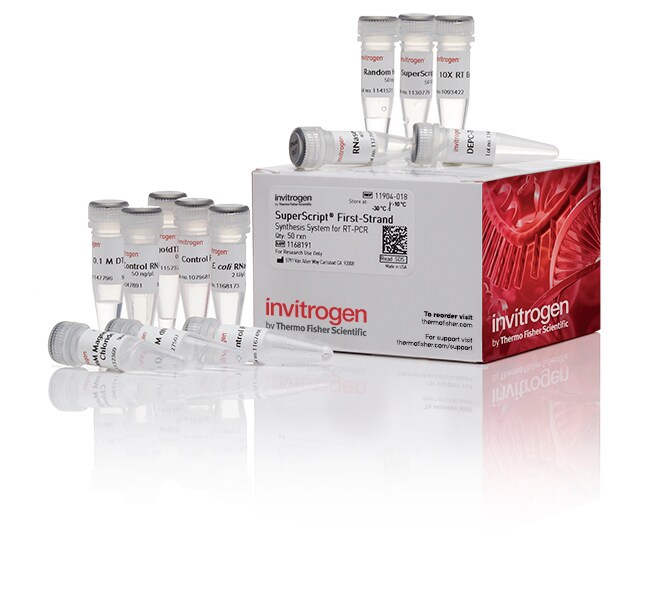
The SuperScript First-Strand Synthesis System for RT-PCR is optimized for the synthesis of first-strand cDNA from purified poly(A)+ or total RNA. The system can be used with as little as 1 ng or as much as 5 μg of total RNA. After synthesis, the cDNA can be amplified with specific primers by PCR without intermediate organic extractions or ethanol precipitations. In conjunction with PCR, the system can be used to detect the presence of rare messages, to quantitate the amount of specific mRNA from small numbers of cells, or to clone specific cDNAs without constructing an entire cDNA library. The system is flexible, allowing the use of any PCR enzyme. Combine with AccuPrime Taq DNA Polymerase or Platinum Taq DNA Polymerase for higher specificity PCR or with AccuPrime Pfx DNA Polymerase for high-fidelity cloning applications.
SuperScript II RT
The first-strand cDNA synthesis reaction is catalyzed by SuperScript II Reverse Transcriptase (RT). This enzyme has been engineered to reduce the RNase H activity that degrades mRNA during the first-strand reaction, resulting in greater full-length cDNA synthesis and higher yields of first-strand cDNA than obtained with RNase H+ RTs. Because SuperScript II RT is not inhibited significantly by ribosomal and transfer RNA, it may be used effectively to synthesize first-strand cDNA from a total RNA preparation. The enzyme exhibits increased thermal stability and may be used at temperatures up to 50°C.
Using the SuperScript First-Strand Synthesis System for RT-PCR
This system has been optimized to synthesize first-strand cDNA from varying amounts of starting material. The SuperScript II RT concentration has been lowered and RNaseOUT Recombinant RNase Inhibitor has been added to the system as part of this optimization process. Additionally, reaction conditions have been modified to further increase the sensitivity of the system. Using the kit, you synthesize first-strand cDNA using either total RNA or poly(A)+ selected RNA primed with oligo(dT), random primers, or a gene-specific primer. Then perform PCR in a separate tube using primers specific for the gene of interest.
| Code | Description |
|---|---|
| 11904018 | Catalog Number: 11904018 |

